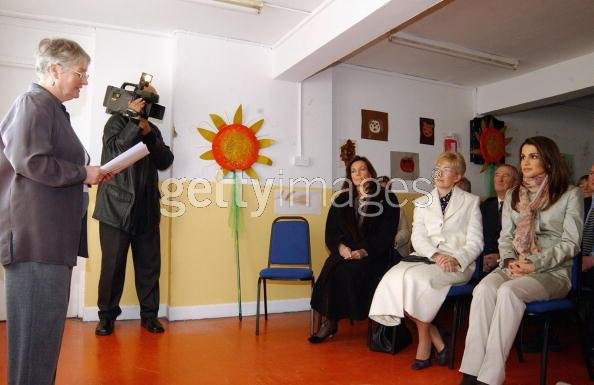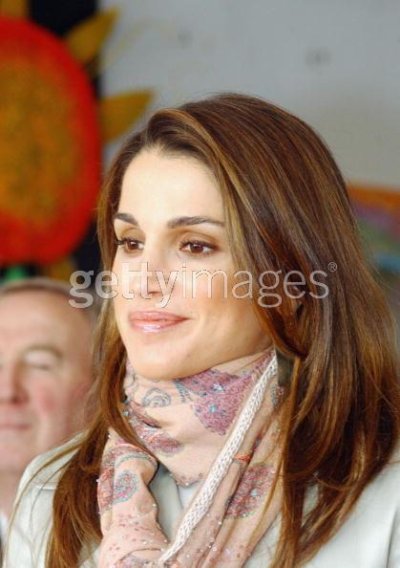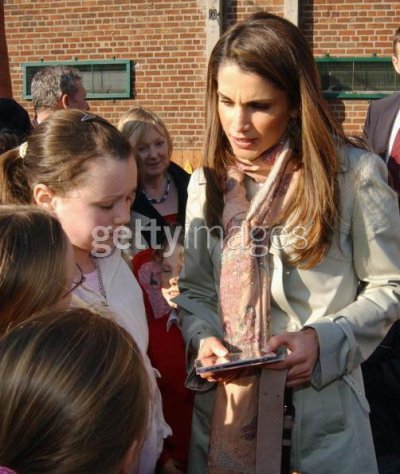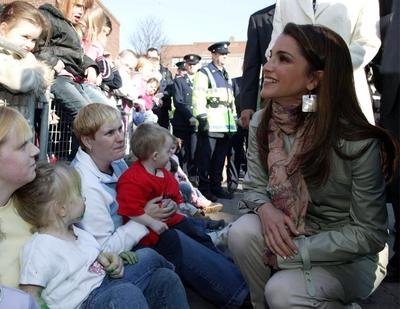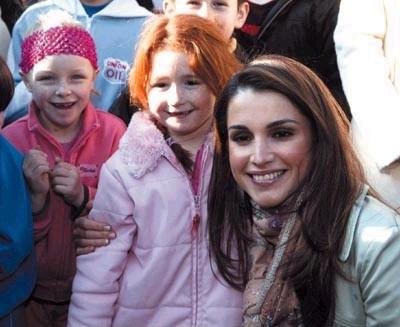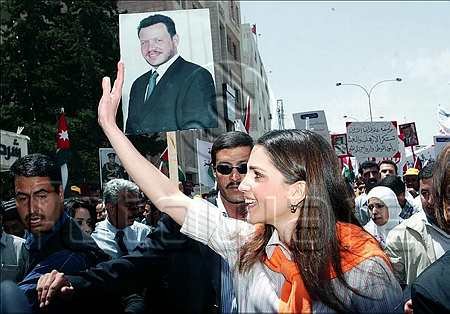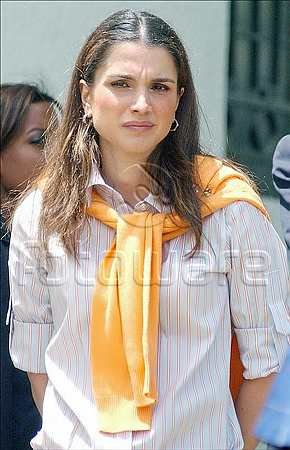What does it say about your country and your country educational system when the king has to send their children out of the country to be educated.........sheesh........and how come jordanians like to criticize the west when they not only send their children their but also frequently married these outsiders????????? of course jordan is not the only country...but i just wanted to know
You are using an out of date browser. It may not display this or other websites correctly.
You should upgrade or use an alternative browser.
You should upgrade or use an alternative browser.
King Abdullah and Queen Rania Current Events 1: September 2003-
- Thread starter Alexandria
- Start date
If you have answers, please help by responding to the unanswered posts.
- Status
- Not open for further replies.
but as you say, it's such a common practice of royalty. Well except for Great Britain, and that seems to be where all foreign royals send their kids...lolOriginally posted by mya@Jan 29th, 2004 - 1:41 am
What does it say about your country and your country educational system when the king has to send their children out of the country to be educated.........sheesh........and how come jordanians like to criticize the west when they not only send their children their but also frequently married these outsiders????????? of course jordan is not the only country...but i just wanted to know
I suppose it says "we have the funds to do this" but I also thought it was part of a multi cultural education so that they can come back to their country with 'fresh eyes' of the world.
Oh interesting to know about little Prince Hussein is away and go to school oversea.
I never knew about it.
Does he go to boarding school, or stay with his Grandma Princess Muna formerly
(Antoinette Gardner). King Abdullah mum...
Do you anything about this? as i am interesting to know.
I never knew about it.
Does he go to boarding school, or stay with his Grandma Princess Muna formerly
(Antoinette Gardner). King Abdullah mum...
Do you anything about this? as i am interesting to know.
Alexandria
Heir Apparent
- Joined
- Jan 14, 2003
- Messages
- 3,207
- Country
- Canada
JARASH, JORDAN: Jordan's King Abdullah II is received by a Jordanian family during his visit to the ancient city of Jarash 28 January 2004. The king visited the town's people prior to the up coming Eid al-Adha, at the end of the annual pilgrimage to Mecca known as the Hajj and carried out by millions of Muslims. The king listened to the people's complaints, worries and needs. Yousef ALLAN/AFP/Getty Images
King Abdullah in Jarash, Jordan
King Abdullah in Jarash, Jordan
Dennism
Majesty
- Joined
- Aug 29, 2003
- Messages
- 6,408
- City
- East of the sun and west of the moon
- Country
- United States
BBC
Jordan is embarking on a radical reform process aimed at modernising the country's political system.
One of the key reforms is getting Jordanian women more involved in public affairs.
The country's monarch, King Abdullah, is behind the moves giving women a bigger and more active role in the political process.
Late last year, he dissolved the upper house of parliament and appointed seven women - the highest number ever - to a new 55-member body.
He also created a special quota system to ensure women would be elected to the lower chamber where they now number six out of 110 members.
Change from above
The king also appointed a female minister, Asma Khader, to serve as the government's spokesperson.
Ms Khader is a prominent lawyer and champion of human rights, particularly women's rights.
Jordan's Prime Minister, Faisal Fayex, for his part, has also urged women's organisations to spur political development in the country.
But some question whether engineering change from above will work in Jordan's traditional society.
The newly appointed senator, Wijdan Talhouni Saket, said King Abdullah is setting the right example to help build democracy in this tribal desert monarchy.
"Jordan is a very conservative society. It is a society of men," she explained.
"Usually men never give their places easily for women if we don't push for it.
"I think this is a first step."
She said the women appointed and elected by the quota system to parliament are mainly activists.
"I am sure and expecting that we are going to do a lot because we have the means, the experience, and now we are encouraged by His Majesty and Queen Rania," she said.
"All of us worked in civil society."
'Too conservative'
Senator Saket has been involved in grassroots development work for the past 20 years.
She has helped launch 250 middle and lower-income women into business by providing facilities, skills and training at her Jordan Forum for Business and Professional Women in the Garden district of Amman.
She said she is contributing her practical business know-how to parliament to help tackle the country's staggering 17% unemployment rate.
But some people argue it will take more than just introducing more women into parliament to change Jordan's political landscape.
Former minister of information, Leila Sharaf, said she did not initially support the idea of a special quota for women.
"I was against it at first," she explained, "because I thought that a quota may bring women who are not experienced in public life, women who are too conservative to push for women's rights or that it may slacken the women's movement."
But Ms Sharaf argues that the country's current election law of one person, one vote will not break the stigma against voting for women.
The quota system may need to be used again for the next parliamentary election, she said, until Jordanians become more accustomed to seeing women in public office.
Exceptions
Amman-based analyst Joost Hiltermann of the International Crisis Group research institute agrees.
"This is a conservative, traditional society. Women can run for election but the chances of their winning are not great," he said.
"In a free and fair election where you are elected as a Jordanian citizen, it is very tough for women to be elected.
"That is the reality.We are talking about exceptions, not about the rule."
He said this reason makes the king's personal intervention to introduce change plausible.
"Appointing women to public office may be a good way to set a model.
"Here, women are taking positions of authority, they can do it and there is nothing wrong with it."
Although this is just one of many reforms King Abdullah is initiating, critics say a number still concentrate power in the hands of the king and do not go far enough.
Another problem is they have not caught on at the grassroots level.
Recently, a lawmaker from the conservative district of Ma'an in the south of the country said women's development is not on his agenda.
The 42-year old monarch may find himself facing an uphill battle with Jordan's traditional stalwarts to create the kind of society he wants to become an example to the rest of the Middle East.
Jordan is embarking on a radical reform process aimed at modernising the country's political system.
One of the key reforms is getting Jordanian women more involved in public affairs.
The country's monarch, King Abdullah, is behind the moves giving women a bigger and more active role in the political process.
Late last year, he dissolved the upper house of parliament and appointed seven women - the highest number ever - to a new 55-member body.
He also created a special quota system to ensure women would be elected to the lower chamber where they now number six out of 110 members.
Change from above
The king also appointed a female minister, Asma Khader, to serve as the government's spokesperson.
Ms Khader is a prominent lawyer and champion of human rights, particularly women's rights.
Jordan's Prime Minister, Faisal Fayex, for his part, has also urged women's organisations to spur political development in the country.
But some question whether engineering change from above will work in Jordan's traditional society.
The newly appointed senator, Wijdan Talhouni Saket, said King Abdullah is setting the right example to help build democracy in this tribal desert monarchy.
"Jordan is a very conservative society. It is a society of men," she explained.
"Usually men never give their places easily for women if we don't push for it.
"I think this is a first step."
She said the women appointed and elected by the quota system to parliament are mainly activists.
"I am sure and expecting that we are going to do a lot because we have the means, the experience, and now we are encouraged by His Majesty and Queen Rania," she said.
"All of us worked in civil society."
'Too conservative'
Senator Saket has been involved in grassroots development work for the past 20 years.
She has helped launch 250 middle and lower-income women into business by providing facilities, skills and training at her Jordan Forum for Business and Professional Women in the Garden district of Amman.
She said she is contributing her practical business know-how to parliament to help tackle the country's staggering 17% unemployment rate.
But some people argue it will take more than just introducing more women into parliament to change Jordan's political landscape.
Former minister of information, Leila Sharaf, said she did not initially support the idea of a special quota for women.
"I was against it at first," she explained, "because I thought that a quota may bring women who are not experienced in public life, women who are too conservative to push for women's rights or that it may slacken the women's movement."
But Ms Sharaf argues that the country's current election law of one person, one vote will not break the stigma against voting for women.
The quota system may need to be used again for the next parliamentary election, she said, until Jordanians become more accustomed to seeing women in public office.
Exceptions
Amman-based analyst Joost Hiltermann of the International Crisis Group research institute agrees.
"This is a conservative, traditional society. Women can run for election but the chances of their winning are not great," he said.
"In a free and fair election where you are elected as a Jordanian citizen, it is very tough for women to be elected.
"That is the reality.We are talking about exceptions, not about the rule."
He said this reason makes the king's personal intervention to introduce change plausible.
"Appointing women to public office may be a good way to set a model.
"Here, women are taking positions of authority, they can do it and there is nothing wrong with it."
Although this is just one of many reforms King Abdullah is initiating, critics say a number still concentrate power in the hands of the king and do not go far enough.
Another problem is they have not caught on at the grassroots level.
Recently, a lawmaker from the conservative district of Ma'an in the south of the country said women's development is not on his agenda.
The 42-year old monarch may find himself facing an uphill battle with Jordan's traditional stalwarts to create the kind of society he wants to become an example to the rest of the Middle East.
Dennism
Majesty
- Joined
- Aug 29, 2003
- Messages
- 6,408
- City
- East of the sun and west of the moon
- Country
- United States
February 9, 2004. Syrian President Bashar al-Assad meets with Jordan's King Abdullah II in Damascus. The two Arab leaders formally launched a dam project on the two countries' Yarmuk River border today at a ceremony in northern Jordan. The king and the president unveiled a commemorative plaque to mark the event before heading to Damascus for official talks.
Sitting
Greeting
Unveiling a plaque
U.S. Secretary of Defense Donald Rumsfeld talks with Jordan's King Abdullah at the 40th Munich Conference on Security Policy in Munich, Germany, Sunday, Feb. 8, 2004.
King and Rumsfield
King in Munich
King in Munich
Sitting
Greeting
Unveiling a plaque
U.S. Secretary of Defense Donald Rumsfeld talks with Jordan's King Abdullah at the 40th Munich Conference on Security Policy in Munich, Germany, Sunday, Feb. 8, 2004.
King and Rumsfield
King in Munich
King in Munich
Alexandria
Heir Apparent
- Joined
- Jan 14, 2003
- Messages
- 3,207
- Country
- Canada
Dennism
Majesty
- Joined
- Aug 29, 2003
- Messages
- 6,408
- City
- East of the sun and west of the moon
- Country
- United States
Jordan's King Abdullah II receives former Israeli premier and Labor Party chief Shimon Peres at his private residence in Amman 10 February 2004. Peres told the Jordanian monarch the establishment of a Palestinian state holds the key to Middle East peace, Petra news agency said. The opposition Israeli leader was on a "private visit" to Jordan, which made peace with Israel in 1994. Israel's former Labor Party leader and defense minister Benjamin Ben Aliezer is seen in the center of the picture.
http://delivery.gettyimages.com/comp/29599...9006875E90564A4
http://delivery.gettyimages.com/comp/29599...9006875E90564A4
srbjakoska
Commoner
- Joined
- Dec 13, 2003
- Messages
- 17
new photoes of the King from Petra:
http://www.petra.gov.jo/photos/2004/47/a22.jpg
http://www.petra.gov.jo/photos/2004/47/a21.jpg
http://www.petra.gov.jo/photos/2004/47/a20.jpg
http://www.petra.gov.jo/photos/2004/47/a19.jpg
http://www.petra.gov.jo/photos/2004/47/a18.jpg
http://www.petra.gov.jo/photos/2004/47/a17.jpg
http://www.petra.gov.jo/photos/2004/47/a14.jpg
http://www.petra.gov.jo/photos/2004/47/a13.jpg
King Abdullah and Queen Rania
http://www.petra.gov.jo/photos/2004/47/a16.jpg
http://www.petra.gov.jo/photos/2004/47/a15.jpg
http://www.petra.gov.jo/photos/2004/47/a22.jpg
http://www.petra.gov.jo/photos/2004/47/a21.jpg
http://www.petra.gov.jo/photos/2004/47/a20.jpg
http://www.petra.gov.jo/photos/2004/47/a19.jpg
http://www.petra.gov.jo/photos/2004/47/a18.jpg
http://www.petra.gov.jo/photos/2004/47/a17.jpg
http://www.petra.gov.jo/photos/2004/47/a14.jpg
http://www.petra.gov.jo/photos/2004/47/a13.jpg
King Abdullah and Queen Rania
http://www.petra.gov.jo/photos/2004/47/a16.jpg
http://www.petra.gov.jo/photos/2004/47/a15.jpg
trish79nl
Commoner
- Joined
- Nov 30, 2003
- Messages
- 35
- Country
- Netherlands
It's so lovely to see that the people love him so much! He is so concerned about his people!
I love him too, he is a great king!!! :flower:

I love him too, he is a great king!!! :flower:
Dennism
Majesty
- Joined
- Aug 29, 2003
- Messages
- 6,408
- City
- East of the sun and west of the moon
- Country
- United States
Jordan's King Abdullah II meets with South Korean Foreign Minister Ban Ki-Moon in Amman 19 February 2004.
http://delivery.gettyimages.com/comp/29958...39C4B126631D43A
http://delivery.gettyimages.com/comp/29958...39C4B126631D43A
Balqis
Nobility
- Joined
- Mar 31, 2004
- Messages
- 319
From Getty Images and Yahoo:
DUBLIN, IRELAND - MARCH 1: Queen Rania of Jordan attends an International Youth Foundation urban regeneration site at the Fatima Mansions on March 1, 2004 in Dublin, Ireland. (Photo by ShowBiz Ireland/Getty Images)
DUBLIN, IRELAND - MARCH 1: Queen Rania of Jordan attends an International Youth Foundation urban regeneration site at the Fatima Mansions on March 1, 2004 in Dublin, Ireland. (Photo by ShowBiz Ireland/Getty Images)
Attachments
Last edited by a moderator:
Jacqueline
Courtier
- Joined
- Sep 29, 2002
- Messages
- 754
Famed for her charity work, or for her clothes!1 MARCH 2004
Famed for her philanthropic work, Queen Rania of Jordan has been championing a cause close to her heart, jetting into London to launch a worldwide children's initiative
Dennism
Majesty
- Joined
- Aug 29, 2003
- Messages
- 6,408
- City
- East of the sun and west of the moon
- Country
- United States
Dennism
Majesty
- Joined
- Aug 29, 2003
- Messages
- 6,408
- City
- East of the sun and west of the moon
- Country
- United States
QUEEN RANIA VISITING SOS CHILDREN'S VILLAGE, AMMAN, JORDAN - 21 MAR 2004http://194.68.33.51/fotoweb/bin/pre...31552A08D9B68F9BB2794D04919049081456F68FE70F4












Last edited by a moderator:
Dennism
Majesty
- Joined
- Aug 29, 2003
- Messages
- 6,408
- City
- East of the sun and west of the moon
- Country
- United States
Queen Rania of Jordan meets children from Fatima Mansions, Dublin Monday March1, 2004. The Queen, who is patron of The International Youth Federation, was there to offer her support to the local people who are regenerating their estate. King Abdullah and Queen Rania were on an official one day visit to Ireland.
1
2
1
2
mashed potatoes
Commoner
- Joined
- Nov 9, 2003
- Messages
- 40
- Country
- Canada
I saw a picture of Queen Rania at the Jaresh festival for 2004 wearing a beautiful burgandy dress. I saw in the yahoo group of Magikal Rania under the Fashion folder and then the Handbag folder.... i know she's known for her handbags. what I can't see properly is the watermark of the agency that took the photograph... all is see is aap and then i can't make out what comes after. i'd like to take a look at other photographs of the dress.
If anyone knows please let me know. thanks.
If anyone knows please let me know. thanks.
What is the problem with Queen Rania?
For years she was a "wonderful Queen","a symbol".For years people admired her "elegance", her "natural taste for fashion". nobody cared about the money she spent .But suddenly , this year, i have began to read criticisms about her.
What happened ?
Has the "most beautiful queen of the world" became a monster ? Or , have the medias suddenly fucussed on her tedancy to buy and buy...? and Why ?
What is going wrong now that didn't before ?
What is your opinion about this phenomenon?

For years she was a "wonderful Queen","a symbol".For years people admired her "elegance", her "natural taste for fashion". nobody cared about the money she spent .But suddenly , this year, i have began to read criticisms about her.
What happened ?
Has the "most beautiful queen of the world" became a monster ? Or , have the medias suddenly fucussed on her tedancy to buy and buy...? and Why ?
What is going wrong now that didn't before ?
What is your opinion about this phenomenon?
maryshawn
Serene Highness
- Joined
- Apr 17, 2004
- Messages
- 1,235
- City
- Green Bay
- Country
- United States
That is an interesting question. I think the media has certainly focused on her "image" as a beautiful woman who must spend a fortune on clothes and jewels and accessories. I have read little of substance about Queen Rania's contributions to the people and her "work." She seems to spend a lot of time jetting around looking gorgeous and that's about it. Now, either the media are just focusing on one aspect of her or she has discovered she is a beautiful woman and is having more fun playing that up. Certainly, she has changed so much since her marriage when she was a pretty, demure young lady--her weight loss alone is so dramatic and amazing, appearance preoccupies a great deal of what she does and projects. It's too bad. I think her predecessors spent a lot more time with the people of Jordan than she does but, again, perhaps the media doesn't report the less exhiliarating aspects of her life. If she is indeed doing a lot to help the people, her press office is letting her down by not promoting that aspect of her life. We'll see; she, God willing, has a long reign ahead of her. Perhaps, with age, she will become more focused and less consumed by style.
Mary Shawn
Queen Rania is beautiful but my goodness she is so thin now. But lovely photos, thanks.
Mary Shawn
Mary Shawn
Queen Rania is beautiful but my goodness she is so thin now. But lovely photos, thanks.
Mary Shawn
Last edited by a moderator:
wymanda
Royal Highness
- Joined
- Oct 31, 2003
- Messages
- 1,557
- City
- Perth
- Country
- Australia
A similar thing happened with Diana and with Sarah Ferguson. For the first 2 or 3 years they could do no wrong. Sarah was billed as being a "breath of fresh air" into the royal family. We then saw it turn, drastically with Sarah, but more subtely with Diana and the press began to focus on what they wore, where they went for holidays etc.
Fortunately Rania has a husband who will support her until this blows over.
Fortunately Rania has a husband who will support her until this blows over.
Charcoal Grey
Newbie
- Joined
- Apr 15, 2004
- Messages
- 3
Hmm...I have yet to see a negative article on Queen Rania in the media, at least in the west. As for the Arab media, it seems to me she is the darling of magazines such as Laha. The only negativity I have encountered in regards to Queen Rania is here on the internet in forums such as this one.
Here's the link to the conference: http://www.sofex.com.jo/SOFEX2004.htm
micas
Royal Highness
- Joined
- Dec 16, 2003
- Messages
- 1,691
- Country
- Portugal
AMMAN, JORDAN: French Defence Minister Michele Alliot-Marie (L) talks to Jordan's Queen Rania during their meeting in Amman 26 April 2004. Alliot-Marie is on official visit to Jordan to attend the international conference and military trade fair. AFP PHOTO JACK GUEZ


Jordan's Queen Rania shakes hands with wellwishers as she takes part in an anti-terrorism protest which drew more than 250,000 people 29 April 2004 in Amman, following Jordan's disclosure it had foiled an attack that could have cost tens of thousands of lives. The demonstration was organised by trade unions and a number of political parties to condemn the suspected Al-Qaeda chemical bombing plot that Jordanian authorities announced earlier this week they had foiled.








Jordan's Queen Rania shakes hands with wellwishers as she takes part in an anti-terrorism protest which drew more than 250,000 people 29 April 2004 in Amman, following Jordan's disclosure it had foiled an attack that could have cost tens of thousands of lives. The demonstration was organised by trade unions and a number of political parties to condemn the suspected Al-Qaeda chemical bombing plot that Jordanian authorities announced earlier this week they had foiled.






Last edited by a moderator:
MAY 3: California Governor Arnold Schwarzenegger ® talks with Jordan's King Abdullah II (L) at Abdullah's Al Barakeh palace May 3, 2004 in Amman, Jordan. Later the leaders had lunch together at the palace. (Photo by John Decker-Pool/Getty Images)


AMMAN, JORDAN - MAY 3: California Governor Arnold Schwarzenegger ® talks with Jordan's King Abdullah II (L) near the helipad at Abdullah's Al Barakeh palace May 3, 2004 in Amman, Jordan


AMMAN, JORDAN - MAY 3: California Governor Arnold Schwarzenegger (2nd L) lunches with Jordan's King Abdullah II (2nd R) at Abdullah's Al Barakeh palace May 3, 2004 in Amman, Jordan. Joing the leaders are Paul Wachter (L) a close friend of Schwarzenegger, Pat Clarey (3rd L), Schwarzenegger's chief of staff; Jordan's Prince Ali (3rd R), and Samer Muasher (L), the Jordanian Royal Film commissioner. (Photo by John Decker-Pool/Getty Images)



AMMAN, JORDAN - MAY 3: California Governor Arnold Schwarzenegger ® talks with Jordan's King Abdullah II (L) near the helipad at Abdullah's Al Barakeh palace May 3, 2004 in Amman, Jordan


AMMAN, JORDAN - MAY 3: California Governor Arnold Schwarzenegger (2nd L) lunches with Jordan's King Abdullah II (2nd R) at Abdullah's Al Barakeh palace May 3, 2004 in Amman, Jordan. Joing the leaders are Paul Wachter (L) a close friend of Schwarzenegger, Pat Clarey (3rd L), Schwarzenegger's chief of staff; Jordan's Prince Ali (3rd R), and Samer Muasher (L), the Jordanian Royal Film commissioner. (Photo by John Decker-Pool/Getty Images)

Last edited by a moderator:
- Status
- Not open for further replies.
Similar threads
- Sticky
- Replies
- 29
- Views
- 3K
- Sticky
- Replies
- 94
- Views
- 15K
- Sticky
- Replies
- 6
- Views
- 2K
- Replies
- 6
- Views
- 596
- Sticky
- Replies
- 18
- Views
- 4K
Latest posts
-
-
On this Day in German Royal/Imperial History
- Latest: CyrilVladisla
-
-










